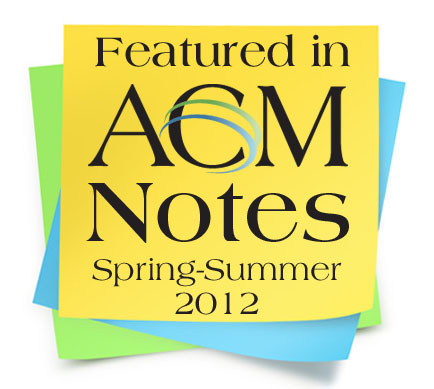It was a long trek – a solid hour and a half – through the Costa Rican countryside to the little school in rural Aguas Zarcas. Macalester College student Chloe Souza had been there earlier in the week to talk to the children and distribute questionnaires for them to take home to their parents.
She was returning to weigh and measure the children and collect the surveys. For Souza, it was another day in the field, gathering data for the research project on childhood obesity that she was doing on the ACM Costa Rica program.
“I got there and 90 percent of the kids weren’t in school that day,” Souza recalled. When she left the school to begin the long walk home, she had just a handful of completed surveys to show for the trip. It was frustrating, she said, but “it was kind of important to keep the bigger picture in mind on days like that.”
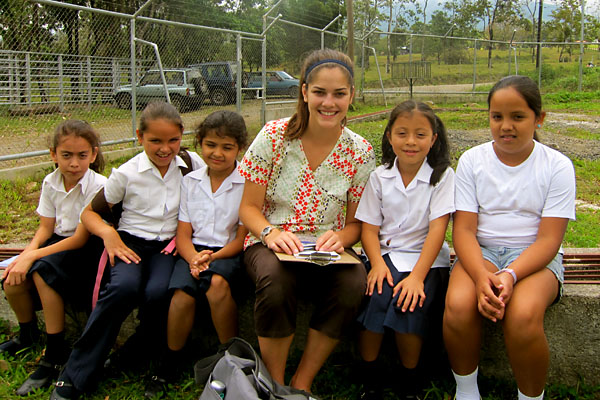 Chloe Souza visiting a school during her field research in Costa Rica.
Chloe Souza visiting a school during her field research in Costa Rica.
Keeping her eye on the bigger picture served Souza well, as her field project in Costa Rica has earned her the Award for Outstanding Research on an ACM Program.
Two other students – Jonathan Henn from St. Olaf College and Chelsea Denault from Albion College – were also honored as finalists for the award for the research projects they conducted in Costa Rica and at the Newberry Library, respectively.
“This award speaks to the key role that independent research plays on ACM campuses and on our off-campus study programs,” said Carol Dickerman, ACM’s Director of International Study Programs. “ACM established its first off-campus program with a research focus more than 50 years ago, so the consortium has a long history of offering these opportunities to students.”
Dickerman presented the award to Souza at the recent ACM Student Symposium on Off-Campus Study, where Souza joined other students in presentations and discussions to share their experiences on off-campus study programs around the world.
Souza, Henn, and Denault were selected as finalists for the Award for Outstanding Research from among students who participated during the 2010-11 academic year in the five ACM programs that include independent research projects as part of the curriculum:
- Costa Rica: Field Research in the Environment, Social Sciences, & Humanities;
- Botswana: University Immersion in Southern Africa;
- India: Culture, Traditions, & Globalization;
- Newberry Seminar: Research in the Humanities; and
- Tanzania: Ecology & Human Origins.
Each year, the directors of those five programs nominate students for the award based on the originality of the student’s project, research design and methodology, and the quality of the student’s analysis and final paper. A committee of faculty and staff drawn from the ACM colleges selects finalists in three subject areas – the humanities, natural sciences, and social sciences – and chooses one of those finalists to receive the award.
Following is more about each of the finalists, their research projects, and comments from the selection committee.
Chloe Souza, Macalester College
- Recipient of the Award for Outstanding Research on an ACM Program and Finalist for Social Sciences
- Project: “Media Screen Time, Physical Activity and Nutritional Indicators as Risk Factors for Childhood and Adolescent Overweight and Obesity in Aguas Zarcas, Costa Rica”
- Participant in Costa Rica: Field Research in the Environment, Social Sciences, & Humanities, Spring 2011
Along with the walking and data gathering, Souza answered the questions of a lot of inquisitive schoolchildren and analyzed spreadsheet after spreadsheet of for her project. During two months of school visits, she worked with 1,025 children, ranging in age from four to 18 years.
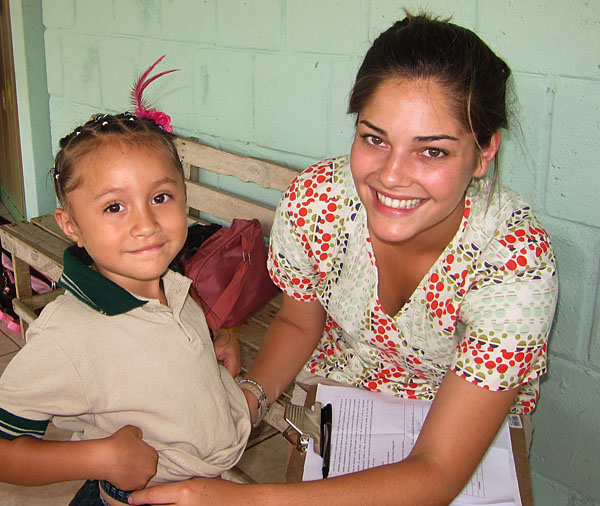 Chloe Souza gathering data for her research project.
Chloe Souza gathering data for her research project.
At each stop, she set up her scales and tape measure to collect the children’s height and weight, and had them fill out a survey about the time they spent sitting in front of a television, computer, or video games – that is “screen time” – and how much exercise they got.
In a unique collaboration, Souza and fellow program participants Jessica Meyer (Colorado College) and Maggie Swift (Macalester College) worked together to develop an overall research plan and survey, while each gathered data in different geographical areas and wrote individual research proposals and final papers.
They designed the study to determine the prevalence of obesity among children and to identify possible factors – such as amount of screen time and physical activity – that put them at risk of being overweight.
Writing for the committee, one of the reviewers commented:
This is an impressive research project. The author identifies a well-defined research question (can particular risk factors for obesity in the school district of Aguas Zarcas be identified?), effectively surveys the research literature (both from other countries and from Costa Rica) to show why this question is important, and clearly develops and explains an appropriate research methodology.
She works hard to get a good sample size; measuring over 1,000 schoolchildren is no small accomplishment. I was particularly impressed with the student’s ability to acknowledge what didn’t work, and to make corrections, an important skill for this kind of field research. For example, she discovers that questions about birth weight will not work, because most mothers of the children with whom she’s working do not have, or do not remember, that information. She modifies her methodology accordingly. Overall, the paper is very clearly written.
Souza, Meyer, and Swift jointly presented their research at ACM’s 4th annual Student Symposium on Off-Campus study. Read more about their research and experiences in Costa Rica on the 2012 Student Symposium webpage and in the article “Hands-on Field Research Meets Cultural Immersion during Project in Rural Costa Rican Schools.”
Jonathan Henn, St. Olaf College
- Finalist for Natural Sciences
- Project: Beach Almond (Terminalia catappa) Seed Resource Size and Resource Partitioning Between the Seed Predators Scarlet Macaw (Ara macao) and Variegated Squirrel (Sciurus variegatoides)
- Participant in Costa Rica: Field Research in the Environment, Social Sciences, & Humanities, Spring 2011
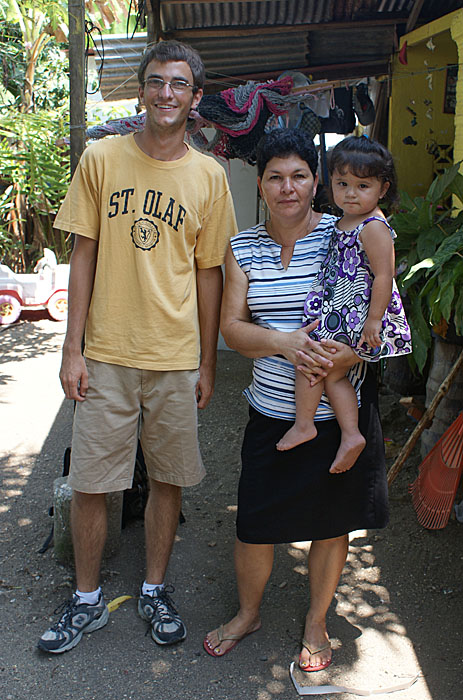 Jonathan Henn with members of his host family in Costa Rica.
Jonathan Henn with members of his host family in Costa Rica.
For his field research, Henn hung out on tropical beaches. He wasn’t on a quest for the perfect suntan or wave, though, but was measuring trees and counting the fruit that had fallen to the ground.
“The ultimate goal of this study,” according to Henn, “was to investigate the role of an exotic species as a food source for endangered scarlet macaws in Costa Rica and how competition with variegated squirrels affected macaw use of the resource.”
He conducted his project on seven beaches along the country’s Pacific coast, measuring the seed production of the beach almond trees and the amount of seeds eaten by macaws and squirrels, both of which rely on the beach almond for food, particularly during the dry season. The number of macaws has been increasing, but is there enough food available to support a growing population?
The award committee was impressed by Henn’s paper and chose it as the finalist for natural sciences “because it best fit the ideal of a scientific study based on original work.” Other comments on the research paper noted that:
Jonathan conceived an interesting and manageable project in which he examined the impact of an invasive species (beach almond) on two native populations, both using the seed of that tree for survival (one of which was endangered), and reached the conclusion that in this unusual case, the invasive species has supported a comeback for the endangered macaws and that the tree is sufficient for both species to share.
From his design and traditional layouts for ecological studies through his data gathering (check the pictures on how one can distinguish an almond that has been cracked open by macaws from one opened by squirrels) and statistical analysis, this paper is well-conceived and presented.
Chelsea Denault, Albion College
- Finalist for Humanities
- Project: “‘The Spirited will act:’ Josiah Quincy, Jr. and the Mob Culture of pre-Revolutionary Boston”
- Participant in Newberry Seminar: Research in the Humanities, Fall 2010
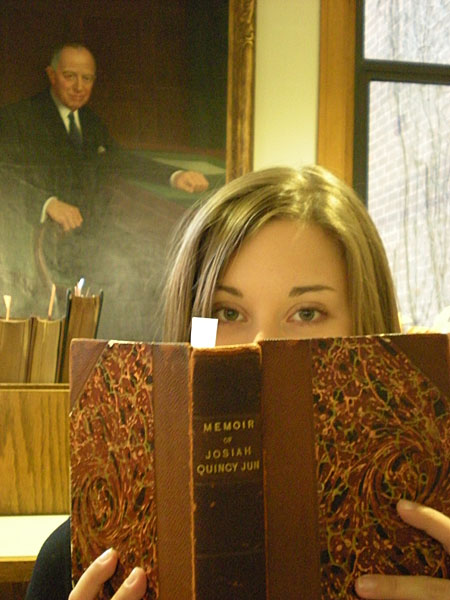 Chelsea Denault
Chelsea Denault
The seeds for the project were planted three years before Denault arrived at the Newberry Library, when she stopped in a small park along the Freedom Trail in Boston and spied a plaque marking the site of the Salutation Tavern. The tavern, opened in 1662, was a meeting place for pre-Revolutionary leaders in colonial Boston. One of the men listed on the plaque – even before such illustrious figures as John Adams and Paul Revere – was Josiah Quincy, Jr.
Denault was intrigued. “Who was this man and why had he seemingly earned a higher place of esteem than others I had been familiar with since third grade?” she wrote in the prologue to her paper. “This, to my curious mind, merited some further investigation. That investigation turned into a three-year fascination with a man who was practically unknown, even to the most avid student of Revolutionary America.”
As a participant in the Newberry Seminar, Denault was finally in the perfect place to dig deeply into Quincy’s life story, his relationship to the mob of Bostonians taking to the streets to protest British rule, and his significance in American history. Her intense interest in her subject was clear to the selection committee, which commented that:
This paper is outstanding on a number of levels. Chelsea’s rich topic makes very good sense for a semester-long program at the Newberry Library where she greatly benefited from numerous primary sources from the 1760s and 1770s (newspapers, almanacs, sermons, pamphlets, etc.), all crucial to her academic research on Josiah Quincy, Jr. and his views on the Boston mob.
Chelsea is particularly successful at carefully using her sources as she builds her argument throughout her essay. She writes clearly and, at times, with passion…. Reading this long, 88-page (!) essay, one senses an inquisitive mind and a real aptitude for research…. She should definitely consider graduate study and/or any career involving research.
More about Denault and her Newberry project is available on the Albion College website.
Note: Photos are courtesy of the students.
Links:
ACM programs that include independent research projects as part of the curriculum:






